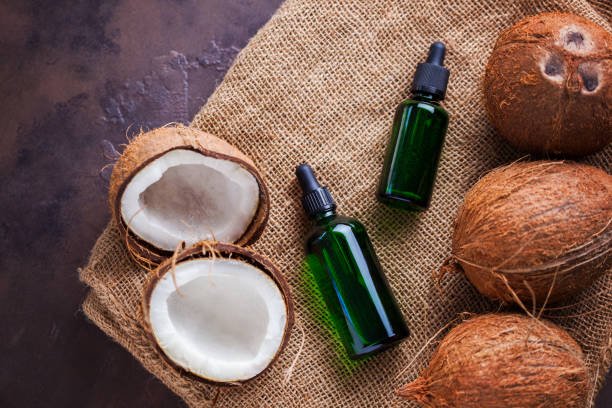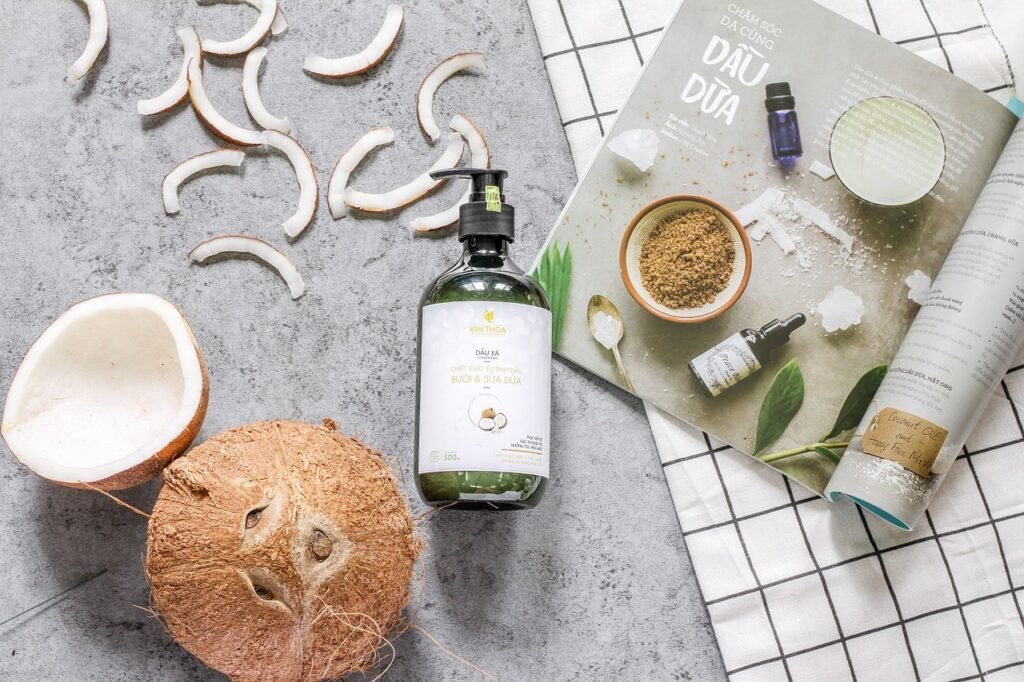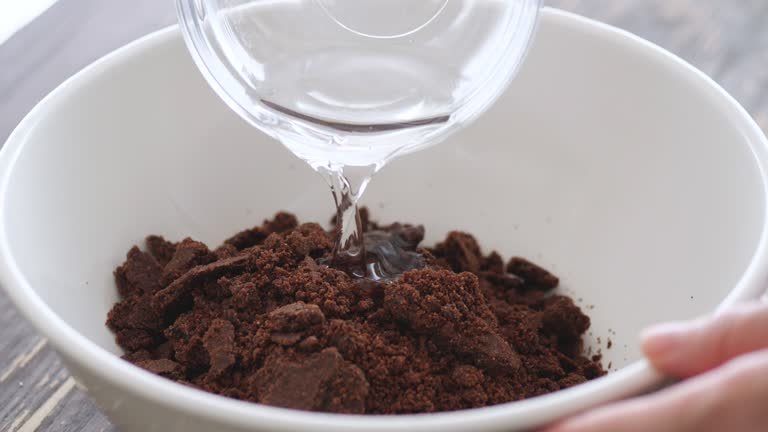Introduction
Coconut oil, extracted from mature coconuts, is a versatile oil celebrated for its numerous health, beauty, and culinary uses. Known for its rich fatty acid composition, it deeply nourishes and hydrates skin and hair, making it a popular ingredient in skincare and haircare. Additionally, coconut oil has antimicrobial properties that support wound healing and oral health. In cooking, it has a high smoke point and adds a subtle flavor to dishes. Overall, coconut oil offers a wide array of benefits that can enhance daily routines.

What are the key benefits of coconut oil for health?
1. Benefits of coconut oil heart health
• Lipid Profile Improvement: Some studies suggest that the medium-chain triglycerides (MCTs) in coconut oil can increase HDL (good) cholesterol levels while potentially reducing LDL (bad) cholesterol.
• Antioxidant Properties: Coconut oil contains antioxidants that may help prevent oxidative stress and reduce inflammation.
2. Benefits of coconut oil for weight loss
• Increases Metabolism: The MCTs in coconut oil can help increase energy expenditure and fat burning.
• Reduces Appetite: Some research indicates that MCTs may help reduce appetite, leading to a decrease in calorie intake.
3. Coconut oil enhances Brain Function
• Energy Source: MCTs can provide a quick source of energy for the brain and may support cognitive function, particularly in individuals with Alzheimer’s disease or other cognitive impairments.
• Ketogenic Benefits: Coconut oil can be a useful addition to a ketogenic diet, as it can help the body produce ketones, which are an alternative energy source for the brain.
4. Antimicrobial Properties is one of the benefits of coconut oil
• Fighting Infections: The lauric acid in coconut oil can convert into monolaurin, a compound with antiviral, antibacterial, and antifungal properties that can help combat various pathogens.
• Oral Health: Coconut oil is used in oil pulling, which may help reduce harmful bacteria in the mouth, promoting better oral hygiene.
5. This amazing oil support Digestive Health
• Gut Health: Coconut oil can help improve digestion by enhancing the absorption of fat-soluble vitamins and nutrients.
• Antimicrobial Effects: It may help combat harmful bacteria and yeast in the gut, promoting a balanced microbiome.
6. Aids in Wound Healing
• Skin Health: Coconut oil’s moisturizing properties can help speed up the healing process of minor cuts, wounds, and skin irritations due to its antimicrobial nature.
7. Anti-Inflammatory effects of coconut oil
• Reducing Inflammation: Coconut oil contains anti-inflammatory properties that may help alleviate chronic inflammation in the body, potentially benefiting conditions like arthritis.
8. Improves Immune Function
• Boosting Immunity: The antioxidants and lauric acid in coconut oil may help strengthen the immune system and protect against illnesses.
Incorporating coconut oil into your diet can offer a range of health benefits, from supporting heart health and weight loss to enhancing brain function and providing antimicrobial protection. However, it’s important to use it in moderation, given its high saturated fat content, and consult a healthcare professional if you have specific health concerns.

Nutrition Facts of Coconut Oil (per 1 tablespoon)
Here are the nutrition facts for coconut oil, typically based on a standard serving size of 1 tablespoon (approximately 14 grams):
• Calories: 120
• Total Fat: 14 g
• Saturated Fat: 12 g
• Monounsaturated Fat: 1 g
• Polyunsaturated Fat: 0 g
• Cholesterol: 0 mg
• Sodium: 0 mg
• Total Carbohydrates: 0 g
• Dietary Fiber: 0 g
• Sugars: 0 g
• Protein: 0 g
Key Components:
• Medium-Chain Triglycerides (MCTs): About 62%–65% of the fat in coconut oil is made up of MCTs, which are metabolized differently from long-chain fatty acids and are thought to provide quick energy.
• Lauric Acid: A significant portion of the saturated fat in coconut oil is lauric acid, which may have antimicrobial and anti-inflammatory properties.
Health Considerations:
• Coconut oil is high in saturated fat, so moderation is key, especially for individuals with certain health conditions.
• It’s beneficial for energy, but the high saturated fat content may not be suitable for everyone, particularly those concerned about heart health.

Top 3 Benefits of Coconut Oil for Hair health
1. Deep Conditioning: Its fatty acids penetrate hair deeply, providing intense hydration and reducing protein loss.
2. Scalp Health: Antifungal properties help combat dandruff and soothe irritation.
3. Shine and Softness: Adds a natural, healthy glow, making hair silky and manageable.
How coconut oil improves skin: moisturization, healing, and mores
1. Moisturization: Rich in fatty acids, it’s fantastic for locking in moisture and softening dry skin.
2. Anti-Aging: Contains antioxidants, which help fight free radicals and reduce signs of aging.
3. Healing: Antimicrobial properties aid in treating minor cuts, wounds, and skin infections.
Benefits of coconut oil for acne
Potential Benefits
1. Antimicrobial Properties: Some studies suggest that coconut oil’s fatty acids can kill certain bacteria that contribute to acne
2. Anti-Inflammatory Effects: It may help reduce inflammation and soothe irritated skin
Potential Drawbacks
1. Pore Clogging: Coconut oil is comedogenic, meaning it can clog pores and potentially worsen acne for those with oily or acne-prone skin
2.Mixed Results: Scientific research on coconut oil’s effectiveness for acne is limited, and results are mixed
Usage Tips
– Patch Test: Always do a patch test before applying coconut oil to your face.
– Moderation: Use it sparingly and avoid applying it to active breakouts.
– Consult a Dermatologist: If you have persistent acne, it’s best to consult a healthcare professional.
Benefits of coconut oil for weight loss
Some studies suggest that MCTs in coconut oil may boost metabolism and reduce appetite, potentially aiding weight loss.

Benefits of Coconut Oil for Cooking
coconut oil uses in cooking because of its benefits for health
- High Smoke Point: Ideal for frying and sautéing without breaking down into harmful compounds.
- Flavor Enhancement: Adds a subtle, sweet coconut flavor to dishes.
- Nutrient-Rich: Packed with medium-chain triglycerides (MCTs), which provide a quick energy boost and support metabolism.
- Beyond frying and baking, you can add it to smoothies for a nutrient boost, use it in salad dressings for a tropical twist, or incorporate it into homemade granola or energy bars.
- For cooking, choose unrefined, cold-pressed coconut oil for maximum flavor and health benefits. Refined coconut oil is better if you prefer a more neutral taste
Frequently asking questions (FAQ)
Can coconut oil be used for cooking and skincare?
Absolutely, it’s highly versatile and safe for both uses. Just make sure you’re using unrefined, organic coconut oil for the best benefits.
Can coconut oil be used to treat eczema?
Yes, coconut oil’s moisturizing and anti-inflammatory properties can help soothe eczema symptoms. However, it’s always best to consult with a healthcare professional before using it as a treatment.
How does coconut oil compare to other oils for hair care?
Unlike many other oils, coconut oil can penetrate the hair shaft, providing deep conditioning and reducing protein loss. Its unique properties make it particularly effective for dry, damaged, or chemically treated hair.
Can I use coconut oil as a natural deodorant?
Yes, coconut oil’s antibacterial properties can help reduce odor-causing bacteria. You can use it alone or mix it with baking soda and essential oils for a DIY deodorant.
Can I use coconut oil as a sunscreen?
Coconut oil has a low SPF (around 4-5), so it’s not recommended as a replacement for sunscreen. It can, however, soothe and moisturize sunburned skin.
Is coconut oil safe for babies?
Yes, coconut oil is often used for baby massages and can help with diaper rashes and dry skin. However, it’s always best to consult with a pediatrician before use.
Does coconut oil help with stretch marks?
Coconut oil may help prevent stretch marks by keeping the skin hydrated, but its effectiveness on existing stretch marks is limited.
Can I use coconut oil as a makeup remover?
Yes, coconut oil works as a natural makeup remover. Apply a small amount to your skin, gently massage, and wipe it off with a damp cloth.
How do I store coconut oil?
Coconut oil should be stored in a cool, dry place. It solidifies at temperatures below 76°F (24°C), but this doesn’t affect its quality. You can melt it by placing the jar in warm water.
Does coconut oil have an expiration date?
While coconut oil has a long shelf life, it can go rancid. Store it properly, and check for any changes in smell or texture to know if it’s expired.
Conclusion
Coconut oil benefits for both health and beauty. It conditions hair, moisturizes skin, and offers anti-aging and healing properties. In cooking, its high smoke point and MCT content support healthy weight management and metabolism. By incorporating coconut oil into daily routines, you can achieve desired beauty outcomes and create delicious vegan desserts. This natural product is an essential addition to every household.
Sources
1. Healthline
4. TODAY


